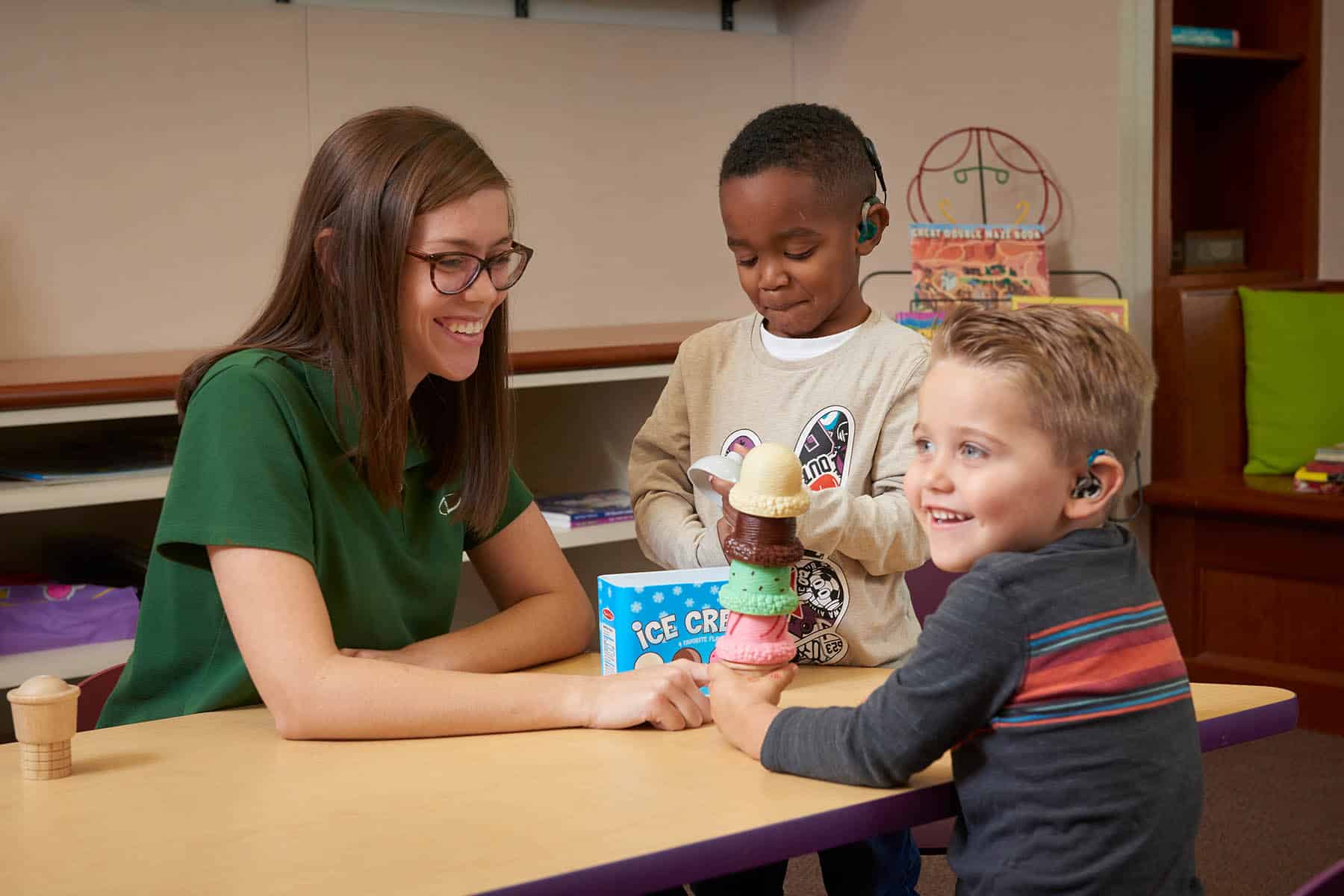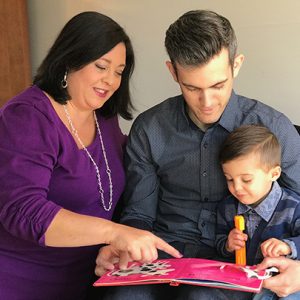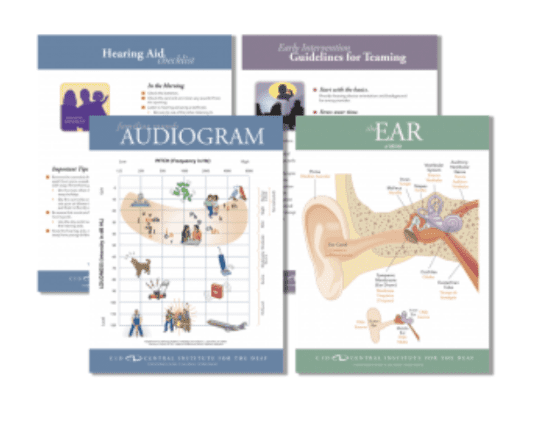Commercially available games that maximize listening, spoken language, and communication are a “WIN” for children who are deaf and hard of hearing. Playing board games in therapy, school and at home can foster positive attitudes towards learning. Well-chosen games played with Listening and Spoken Language (LSL) strategies and techniques strengthen listening skills, direction following, expand vocabulary, auditory memory, auditory processing and comprehension of conversational speech. Simply by playing games, children learn important social skills such as sharing, waiting, taking turns and self-advocacy strategies. Following game rules and fair play builds respect. Games help children take responsibility for their own communication success as they are motivated to listen to others, use intelligible speech and express their thoughts clearly.
Roald Dahl once wrote, “Life is more fun when you play games.” Studies reveal playing games produces endorphins that stimulate the brain. These endorphins give children a great sense of happiness and excitement that foster favorable learning opportunities. Games can make learning seem almost effortless. For young children and their families in early intervention, we tuck LSL learning into engaging activities with toys, books, songs and daily routines. Older children want to have fun, and there is no reason they shouldn’t. Many kids and teens have been in therapy for years and are not motivated by activities that look like therapy, so board games are powerful tools.
The Game Plan
Professionals and parents are responsible for weaving LSL strategies, goals and objectives into the game experience. A GAME PLAN is paramount for positive outcomes rather than just a lucky roll of the dice. A strategy for success is worked out in advance. Step one is choosing a game that is developmentally appropriate based on the child’s current goals and their listening, language and learning needs. Resist the temptation to play a game only because it is popular or marketed as therapy-based or educational. Secondly, determine which LSL strategies to incorporate for effective gameplay. Auditory first, wait time, an expectant look, providing choices, adjusting the size of the set, pausing before challenging information, modeling a correct response and asking, “What did you hear?” facilitate auditory learning. Finally, prepare ahead and know the game set up, rules and any modifications. There is a wise adage often attributed to Benjamin Franklin, “If you fail to plan, you are planning to fail.”
Off The Shelf Games
There are countless games on the market to target a plethora of LSL goals and can easily be played in therapy, school and at home. Many word-related games challenge children that are deaf or hard of hearing as they center around ambiguous and figurative language, analogies and humor. Well-chosen games build auditory skills, increase auditory memory and working memory, teach vocabulary, categories, inferences and descriptors, strengthen lexical organizations and foster critical thinking while promoting a growth mindset.
When introducing a game, talk about the cards or the game board and the actions necessary to play. Give auditory directions to follow for set up, tear down, and game play. Have the child or teen retell the rules of the game to other players. Talk about the importance of sportsmanship and how to be a good winner or loser.
Lynn’s Best Bets
These games all have excellent replay value and feature a variety of genres. Targeting multiple goals with games makes planning efficient. Here are ten games that I use in my practice that motivate and engage children, teens and families. So have a little fun and play games!
1. Would You Rather? SpinMaster Games or minds-in-bloom.com
Would you rather get stung by three bees or get a really bad sunburn? Listen then defend your choice. Neither is never an answer.
Skills: Develops the ability to reason, explain, persuade, and problem-solve
2. Don’t Say It! Pressman
Can you get the other players to say FISH? It’s not as easy as it sounds because you can’t say scales, fins, water, or hook.
Skills: Promotes flexible thinking and vocabulary
3. BackSeat Drawing Patch Products
The artists don’t know what they are drawing but listen and follow the instructions given by another player.
Skills: Fosters describing, problem-solving and clarification skills
4. TAPPLE USAopoly
Fast-paced word game. Pick a category, give answers for the topic by the first letter of the word, then pass the Tapple wheel and beat the timer.
Skills: Improves categorizing and vocabulary
5. Tribond Patch Products
Games of Threes. Players listen to a list of three items and determine the common bond. At first, they may seem to have nothing in common. Camp, Place, Wild are linked by the word fire. Palm, Christmas, Apple are linked by the word tree.
Skills: Boosts auditory association
6. What’s Yours Like? Patch Products
Share descriptions that are truthful, yet clever, so the player in the hot seat listens but doesn’t get an easy guess. An example is a swimsuit. Clues could be, “Mine has strings.” “Mine gets wet.”
Skills: Enhances auditory memory and comprehension
7. Rhyme Out Educational Insights
A triple-rhyming card game that the players take turns listening to the 3 clues. Race to shout out 3 correct responses that rhyme! CLUES: What bees do if you make them mad. What bells do when shaken. What birds do in the morning. Answers: Sting. Ring. Sing.
Skills: Encourages quick thinking skills and auditory comprehension
8. Five Second Rule Play Monster
It should be easy to name 3 breeds of dogs. The pressure is on with a 5-second twisted timer that makes a fun zooooop sound when turned over and tiny metal balls swirl down to keep time.
Skills: Advances vocabulary and quick word recall
9. Blurt! Educational Insights
A word race to identify words by listening to the definition. A drink made from lemon juice and sweetened water – LEMONADE. BLURT it out!
Skills: Targets vocabulary and word recall
10. Buzzword Play Monster
Listen to solve 10 clues. All the answers contain a Buzzword word such as “ball.” Clue: On top of spaghetti Answer: Meatball. Clue: Inflatable sand toy Answer: Beachball.|
Skills: Strengthens auditory processing
I would love to hear games you recommend and play in LSL lessons or sessions. I can never have too many games so share by email at Lynn@HearSayLW.com
The endorsements on this list are the author’s own and do not reflect on CID.
Meet Lynn A. Wood MA CCC/A LSLS Cert. AVT, a Rehabilitative Audiologist and an Auditory Verbal Therapist at the Auditory Verbal Center of Wheaton in Illinois. Auditory Verbal Therapy is the heart of her practice and Lynn also specializes in post cochlear implant rehabilitation and therapy for individuals with auditory processing needs. Lynn actively consults in the field as a Rehabilitation Specialist and a Professional Outreach Representative for Advanced Bionics, LLC, at HearingFirst.org and for BioSpeech.org. Lynn has held contracts with Cochlear Ltd. and authored content for auditory rehabilitation. Lynn is on the Board of the Illinois Chapter of the Alexander Graham Bell Association for the Deaf and Hard of Hearing. She served on the Board of Illinois Hands and Voices and was a co-founder of Hearing Connections, a group for Auditory-Verbal families and friends in Chicagoland. Lynn presents at local, state, and national conferences and has worked internationally mentoring professionals and providing auditory verbal therapy.
\













